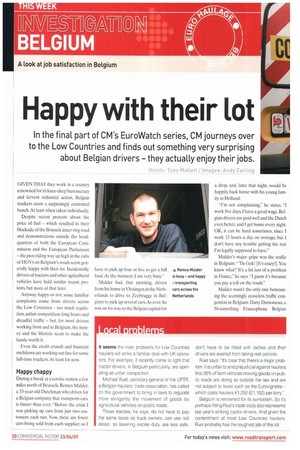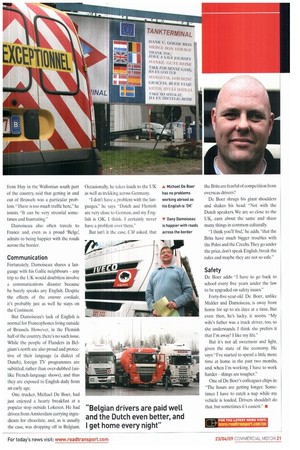Happy with their lot
Page 20

Page 21

If you've noticed an error in this article please click here to report it so we can fix it.
In the final part of CM's EuroWatch series, CM journeys over L. to the Low Countries and finds out something very surprising or about Belgian drivers they actually enjoy their jobs.
Words: Tony Mallett / Images: Andy Carling
GIVEN THAT they work in a country renowned for its knee-deep bureaucracy and fervent industrial action, Belgian truckers seem a surprisingly contented bunch. At least when taken individually.
Despite recent protests about the price of fuel — which resulted in their blockade of the Brussels inner ring road and demonstrations outside the headquarters of both the European Commission and the European Parliament — the pros riding way up high in the cabs of HGVs on Belgium's roads seem generally happy with their lot, Incidentally, drivers of tractors and other agricultural vehicles have held similar recent protests, but more of that later.
Anyway, happy or not, some familiar complaints come from drivers across the Low Countries — too much regulation, unfair competition, long hours and dreadful traffic — but, for most drivers working from and in Belgium, the money and the lifestyle seem to make the hassle worth it.
Even the credit crunch and financial meltdown are working out tine for some full-time truckers. At least for now.
Happy chappy
During a break at a service station a few miles north of Brussels. Remco Mulder, a 33-year-old Dutchman who drives for a Belgian company that transports cars. is busier than ever. "Before the crisis I was picking up cars from just two customers each run. Now, there are fewer cars being sold from each supplier, so I have to pick up four or five to get a full load. At the moment. I am very busy."
Mulder had, that morning, driven from his home in Vlissingen in the Netherlands to drive to Zeebrugge in Belgium to pick up several cars. As ever, be was on his way to the Belgian capital for a drop, and, later that night, would be happily back home with his young family in Holland.
"I'm not complaining," he states. "I work five days, I have a good wage. Belgian drivers are paid well and the Dutch even better, and I get home every night. OK, it can be hard sometimes, since I work 13 hours a day on average, but I don't have any trouble getting the rest I'm legally supposed to have," Mulder's major gripe was the traffic in Belgium: "'Tis Gek! [It's crazy!]. You know what? It's a lot less of a problem in France," he says. "T guess it's because you pay a toll on the roads."
Mulder wasn't the only one bemoaning the seemingly ceaseless traffic congestion in Belgium. Dany Damoiseau, a 50-something Francophone Belgian from Huy in the Wallonian south part of the country, said that getting in and out of Brussels was a particular problem. "There is too much traffic here," he insists. "It can be very stressful sometimes and frustrating."
Damoiseau also often travels to France and, even as a proud 'Beige', admits to being happier with the roads across the border.
Communication Fortunately, Damoiseau shares a language with his Gallic neighbours — any trip to the UK would doubtless involve a communications disaster because he barely speaks any English. Despite the effects of the entente cordiale, probably just as well he stays on the Continent.
But Damoiseau's lack of English is normal for Francophones living outside of Brussels. However, in the Flemish half of the country, there's no such issue. While the people of Flanders in Belgium's north are also proud and protective of their language (a dialect of Dutch), foreign TV programmes are subtitled, rather than over-dubbed (unlike French-language shows), and thus they are exposed to English daily from an early age.
One trucker, Michael De Boer, had just enjoyed a hearty breakfast at a popular stop outside Lokeren. He had driven from Amsterdam carrying ingredients for chocolate, and, as is usually the case, was dropping off in Belgium. Occasionally, he takes loads to the UK as well as trekking across Germany.
"I don't have a problem with the languages," he says. "Dutch and Flemish are very close to German, and my English is OK, I think. I certainly never have a problem over there."
But isn't it the case, CM asked, that the Brits are fearful of competition from overseas drivers?
De Boer shrugs his giant shoulders and shakes his head. "Not with the Dutch speakers. We are so close to the UK, earn about the same and share many things in common culturally.
"I think you'll find,' he adds, "that the Brits have much bigger troubles with the Poles and the Czechs.They go under the price, don't speak English, break the rules and maybe they are not so safe."
Safety De Boer adds: "I have to go back to school every five years under the law to be upgraded on safety issues."
Forty-five-year-old De Boer, unlike Mulder and Damoiseau, is away from home for up to six days at a time. But even then, he's lucky, it seems. "My wife's father was a truck driver, too, so she understands. I think she prefers it that I'm away! I like my life."
But it's not all sweetness and light, given the state of the economy. He says: "I've started to spend a little more time at home in the past two months, and, when I'm working, I have to work harder — things are tougher."
One of De Boer's colleagues chips in: "The hours are getting longer. Sometimes I have to catch a nap while my vehicle is loaded. Drivers shouldn't do that, but sometimes it's easiest." •
FOR THE LATEST NEWS VISIT:
vvww.roadtransport.comlem
















































































































































